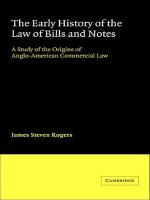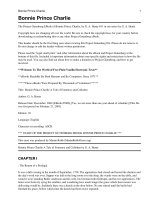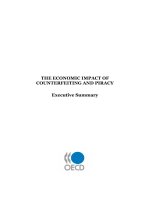THE EARLY HISTORY OF THE LAW OF BILLS AND NOTES ppt
Bạn đang xem bản rút gọn của tài liệu. Xem và tải ngay bản đầy đủ của tài liệu tại đây (7.88 MB, 297 trang )
This study traces the history of the law of
bills
and notes in England
from medieval times to the period in the late eighteenth and early
nineteenth centuries when bills played a central role in the domestic
and international financial system. It challenges the traditional
theory that English commercial law developed by incorporation of
the concept of negotiability and other rules from an ancient body of
customary law known as the law merchant. Professor Rogers shows
that the law of bills was developed within the common law system
itself,
in response to changing economic and business practices.
This account draws on economic and business history to explain
how bills were actually used and to examine the relationship
between the law of bills and economic and social controversies,
including the medieval usury proscription, the disputes among
mercantilist economic writers on the impact of exchange trans-
actions on the balance of trade, and the early nineteenth-century
dispute over the 'real bills' theory of banking and monetary policy.CAMBRIDGE STUDIES IN ENGLISH
LEGAL HISTORY
THE EARLY HISTORY OF THE
LAW OF BILLS AND NOTES
CAMBRIDGE STUDIES
IN ENGLISH LEGAL HISTORY
Edited by
J. H. BAKER
Fellow
of St
Catharine's
College,
Cambridge
Recent series titles include
The law of treason in England in the later Middle Ages
J. G. BELLAMY
William Sheppard, Cromweirs law reformer
NANCY L. MATTHEWS
The English judiciary in the age of Glanvill and Bracton c. 1176-1239
RALPH V. TURNER
Pettyfoggers and vipers of the Commonwealth
The 'lower branch' of the legal profession in early modern England
CHRISTOPHER W. BROOKS
Sir William Scott, Lord Stowell
Judge of the High Court of Admiralty, 1798-1828
HENRY J. BOURGUIGNON
Sir Henry Maine
A study in Victorian jurisprudence
R. c. j. COCKS
Roman canon law in Reformation England
R. H. HELMHOLZ
Fundamental authority in late Medieval English law
NORMAN DOE
Law, Politics and the Church of England
The Career of Stephen Lushington 1782-1873
S. M. WADDAMS
The early history of the law of bills and notes
A study of the origins of Anglo-American commercial law
JAMES STEVEN ROGERS
THE EARLY HISTORY
OF THE
LAW OF BILLS
AND NOTES
A STUDY OF THE ORIGINS
OF ANGLO-AMERICAN COMMERCIAL
LAW
JAMES STEVEN ROGERS
Boston College Law School
|
CAMBRIDGE
UNIVERSITY PRESS
PUBLISHED BY THE PRESS SYNDICATE OF THE UNIVERSITY OF CAMBRIDGE
The Pitt Building, Trumpington Street, Cambridge, United Kingdom
CAMBRIDGE UNIVERSITY PRESS
The Edinburgh Building, Cambridge CB2 2RU, UK
40 West 20th Street, New York NY 10011-4211, USA
477 Williamstown Road, Port Melbourne, VIC 3207, Australia
Ruiz de Alarcon 13, 28014 Madrid, Spain
Dock House, The Waterfront, Cape Town 8001, South Africa
http ://www.cambridge.org
© Cambridge University Press 1995
This book is in copyright. Subject to statutory exception
and to the provisions of relevant collective licensing agreements,
no reproduction of any part may take place without
the written permission of Cambridge University Press.
First published 1995
Reprinted 1996
First paperback edition 2004
A catalogue record for this book is available from the British Library
Library of
Congress
Cataloguing in Publication data
Rogers, James Steven, 1951-
The early history of the law of bills and notes: a study of the
origins of Anglo-American commercial law / by James Steven Rogers.
p.
cm. - (Cambridge studies in English legal history)
Includes bibliographical references.
ISBN 0 52144212 5 hardback
1.
Negotiable instruments - Great Britain - History. 2. Bills of
exchange - Great Britain - History. I. Title. II. Series.
KD1695.R64 1995
346.4 r096-dc20
[344.10696] 94-15928 CIP
ISBN 0 52144212 5 hardback
ISBN 0 52152204 8 paperback
TO
DOROTHY AND EMMA
Preface page xi
Table of
cases
and precedents xv
Note on citation xxv
Introduction 1
The central courts, commercial law, and the law
merchant 12
Commercial cases in the central courts 12
The law merchant and the mercantile courts 20
The law merchant in the central courts 27
Early exchange transactions: commercial practice 32
Exchange transactions as means of funds transfer 32
Exchange transactions as finance 36
The dual functions of exchange 41
Early exchange transactions: private law 44
Exchange contracts in the mercantile courts 44
Exchange contracts in the Admiralty Court 51
Exchange contracts in the common law courts 54
Early exchange transactions: public law and policy 69
The debate over usury in exchange 70
The exchange controversy in England 75
The significance of the public controversy over
exchange 88
From exchange transactions to bills of exchange:
the transformation of commercial practice 94
The era of exchange transactions and the era of bills of
exchange 94
The middleman economy and the development of
inland bills 100
x Contents
The economic functions of bills in the seventeenth
and eighteenth centuries 108
6 The custom of merchants and the development of
the law of bills 125
Actions on bills versus actions on exchange contracts 125
Development of pleadings for actions on bills 127
The significance of the changes in pleading 131
The role of the custom of merchants 137
7 The civilians and the law of bills in the seventeenth
century 151
Civilian literature on the law merchant and exchange 151
The political context of the seventeenth-century
English literature on the law merchant 153
A genuine but unsuccessful effort to incorporate
civilian law 160
The impossibility of incorporation 164
8 Transferability and negotiability 170
Transferability 170
The promissory notes cases: drawing the boundary
between the law of bills and the general law of
obligations 177
Rights of bona fide holders 186
9 The law of bills and notes in the eighteenth century 194
Acceptance 195
Delay in presentment and notice of dishonour 202
Lord Mansfield and the law of bills 210
10 The problem of accommodation bills 223
The Livesey bankruptcy and accommodation bills 223
The economic context of the accommodation bills
cases 228
The judicial response to accommodation bills 232
The accommodation bills controversy as an illustration
of the role of law in economic controversies 246
Conclusion 250
Bibliography 253
Index 265
PREFACE
The research and study that resulted in this book was prompted
not by an interest in legal history as such, but by
a
concern with the
state of modern commercial law. Some years ago, in the process of
teaching American law school courses in commercial law, I came to
the realization that something was amiss with the law of negotiable
instruments as embodied in Articles 3 and 4 of the American
Uniform Commercial Code, which serves as the basis for much of
the law governing payments by cheque. Standard sources on
modern law included enough historical background to make it
clear, even to one unschooled in legal history, that the transactions
involved in the eighteenth-century English cases in which what we
now know as negotiable instruments law developed bore little if
any resemblance to modern payment and credit transactions. The
basic rules and conceptual structure of the law, however, seem to
have remained unchanged. I could not help but suspect that many
of the problems in current law might be attributable to the pro-
fession's failure to give serious consideration to whether the basic
concepts of negotiable instruments law remained a sound basis for
modern law. That concern was heightened by the realization that
we were rapidly moving toward a payment system in which the
pieces of paper that form the basis of negotiable instruments law
would be replaced by electronic media. Ironically, the concern for
the future of commercial law led me to examine its past. Much of
the literature on the emerging law of electronic payment systems
seemed to proceed from the assumption that present law is well
adapted to the technology and practice of the cheque system, and
that the problem is to determine what changes are made necessary
by new technology. By contrast, I had come to believe that the
basic conceptual structure of twentieth-century law was itself a
relic of the past and fundamentally ill-suited even to the paper-
xii Preface
based cheque system. Prompted by these concerns, I set out on
what I thought would be a relatively brief foray into the history of
negotiable instruments law which would serve as the basis for
further work on problems of the commercial law of the present and
future.
What I initially envisioned as a project involving nothing more
than tracing American law of bills and notes from the early nine-
teenth century to the present quickly grew to encompass not only
law but business and economic history, not only the Anglo-
American experience but that of many cultures, and not only the
recent past but many centuries. Along the way, I became fasci-
nated with legal history in its own right, and nearly gave up any
thought of returning to work on modern law. The original impetus
has,
however, had a significant impact on the scope and approach
of the project, and it may be appropriate to elaborate in order to
assist the reader in assessing this work.
As I began examining early-nineteenth-century American cases
involving bills and notes, I found that I could not understand the
history of negotiable instruments law without a better understand-
ing of the history of commercial practice. Accordingly I turned to
the literature on business and economic history, starting with
accounts of nineteenth-century American practice. I found,
however, that I could not understand American practice in iso-
lation, both because of the extent to which the American economy
was linked to the English economy and because American commer-
cial practice and law was largely based on earlier English experi-
ence.
I turned to an examination of English practice and law, but
found that since the English drew much of their commercial
technique from the Dutch, I had to examine the practice of mer-
chants of the Low Countries in the sixteenth and seventeenth
centuries, and since the merchants of the Low Countries drew
much of their commercial technique from the Italian merchants
who had established outposts in Bruges and elsewhere in northern
Europe, my path led back to the affairs of the merchants and
bankers of Renaissance Italy. No doubt early Italian commercial
techniques were influenced by the practices of the medieval Arabic
merchants with whom they traded on the eastern shores of the
Mediterranean, but I concluded that enough was enough.
Armed with some sense of the history of commercial practice,
I turned to the examination of strictly legal sources. Again I
Preface
xiii
encountered the problem of a constantly expanding universe of
fruitful lines of inquiry. Initially, I thought that since my study
was focused on the specifics of law and practice concerning negoti-
able instruments, there was neither need nor occasion for me to
devote much attention to broader questions about the develop-
ment of commercial law generally nor to enter into the long-
standing debates about the jurisprudential nature of the 'law
merchant'. I found, though, that in the Anglo-American tradition
the subject of bills and notes has occupied such a prominent place
in theories of the development of commercial law and accounts of
the relationship between the law merchant and the common law,
that it was not possible to separate the narrower from the broader
inquiry. Indeed, the inquiry into the meaning of the law merchant
seemed to move irresistibly from the background to centre stage,
and the history of the law of bills became less the subject itself than
the vehicle for examination of larger issues about the relationship
between commercial law and commercial practice and the role of
social and economic conflict in the evolution of private law rules.
One consequence of my inability to maintain firm control over
the definition of the subject is that this work may well be open to
the criticism of dilettantism. I am convinced that allowing the
scope to expand has enabled me to produce a richer account of the
history of the law of bills than that found in the standard works on
Anglo-American legal history or modern commercial law, yet I
realize that I have covered far more material than I could hope to
master completely and have undoubtedly overlooked many bodies
of literature that would have contributed to a more complete and
accurate understanding of various aspects of the topics that I have
touched upon. In particular, I have made only the most limited use
of the rich literature of continental legal history that might provide
a valuable comparative perspective on, and might indeed be
directly relevant to, the story of the development of Anglo-
American commercial law.
The rather circuitous path that this work has taken also explains,
though may not entirely justify, the ambiguity about whether this
is strictly a work on legal history or a work on the historical
foundations of modern law, and whether it is a work on English
law, American law, or both. Measured by the events, ideas, and
legal doctrines described, this is unquestionably a work on English
legal history. Yet inasmuch as the work began as, and remains in
xiv Preface
part, an effort by an American commercial law professor to under-
stand the historical origins of his subject, it can be described as a
work on the origins of Anglo-American commercial law. Fortu-
nately, for the period covered, it seems fair to speak of English and
American law as a single system. As in so many other fields,
American law of bills and notes was in large measure based on
English sources, and throughout the late eighteenth and early
nineteenth centuries each system freely drew upon authorities
from the other. By the middle of the nineteenth century, the
differences in practice and in particular substantive legal rules had
probably become sufficiently significant that a comprehensive
history of doctrine and practice would require separate treatment
of the two systems. This work, however, carries the story only up
to the beginning of the nineteenth century, so treating the subject
as Anglo-American seems appropriate. Since the assumptions
about the historical foundations of negotiability described herein
are common to both systems, where reference to modern law or
practice is required in order to illustrate the assumptions that
underlie the traditional accounts of the early history of the law of
bills,
I have drawn freely upon my own familiarity with modern
American law and practice rather than seeking out parallel
examples in modern English law and practice.
I am indebted to many persons for comments and encourage-
ment on this project, or parts of it, at various stages. In particular,
I wish to thank John Baker, Daniel Coquillette, Charles Donahue,
Domenico Maffei, James Oldham, and Vito Piergiovanni. The
staffs of
the
Boston College Law School Library and Harvard Law
School Library provided great assistance.
Earlier versions of parts of this book have been published in
article form as 'The Myth of Negotiability', Boston
College
Law
Review
31
(1990): 265-334, and 'The Problem of Accommodation
Bills:
Banking Theory and The Law of
Bills
and Notes in the Early
Nineteenth Century', in The
Growth
of
the
Bank
as
Institution
and
the
Development
of
Money-Business
Law, edited by Vito Piergio-
vanni, 119-55, Comparative Studies in Continental and Anglo-
American Legal History, band 12, Berlin: Duncker & Humblot,
1993.
TABLE OF CASES AND PRECEDENTS
Abingdon v. Martin (1293), 23 SS 65 page 173, 174
Aboas v. Raworth (1666), Vidian, Exact Pleader, 30 128, 171
Ancher v. Bank of England (1781), 2 Doug. 637 212
Anon.
(c. 1560s), Rastell, Entrees, lOr 57, 132, 133
Anon.
(1647), Style 31 15
Anon.
(1652), Style 366 146
Anon.
(1693), Holt 115, Skin. 343, query s.c. Williams v.
Field (1693), 3 Salk. 68 172-73
Anon.
(1697), 1 Com. 43 189, 220
Anon.
(1698), 1 Ld Raym. 738, 1 Salk. 126, 3 Salk. 71 187
Anon.
(1698), 2 Salk. 669 167
Anon.
(1698), Holt 296, 12 Mod. 345 198
Anon.
(1700), Holt 298, 12 Mod. 408 203
Anon.
(1701), 12 Mod. 447 196
Anon.
v. Elborough (1677), 3 Keb. 765 182
Appleby v. Biddle (1717), cited in Morice v. Lee (1725), 8
Mod. 362 185
Appleton v. Sweetapple (1782), 3 Doug. 137 205, 212, 221
Ashurst v. Thomas (1666), Vidian, Exact Pleader, 33 128
Aswel v. Osborn (1627), Vidian, £*ac* Pleader, 67 128
^w&rey v. F/ory (1321), Y.B. 14 Edw. II, Eyre of London,
86 SS 235 14, 24, 30
Austen
v.
Castelyn (1541), Select Pleas Admiralty, 6 SS 106 52
Bagshaw v. Playn (1596), Cro. Eliz. 536, Moore 704 56
Banbury v. Lisset (1744), 2 Str. 1211 213-14, 220
Bandon's Case, Y.B. 6 & 7 Edw. II, Eyre of Kent, 27 SS
48,
s.c. Seclect Cases Law Merchant, 46 SS lxxxi; s.c.
sub nom. Compton v. Anon., Select Cases Law Merchant,
46 SS lxxxii; s.c. sub nom. Comberton v. Comberton,
Select Cases Law Merchant, 46 SS lxxxiv 30-31
xvi Table of
cases
and precedents
Bank of England v. Newman (1698), 12 Mod. 241, 1 Ld
Raym. 442, 1 Com. 57 146-47
Bank of Ireland v. Archer & Daly (1843), 11 M. & W. 383 201
Barnaby v. Rigalt (1632), Cro. Car. 301 128, 136, 140
Barnesley v. Baldwyn (1741), 7 Mod. 417 185
Bate's Case (1606), 2 Howell's State Trials 371 157
Beaulieu v. Finglam (1401), Y.B. 2 Hen. IV, f. 18, pi. 6 142
Bellasis v. Hester (1697), 1 Ld Raym. 280 222
Beresford v. Bacon (1604), 2 Lutw. 1317 139
Bickerdike v. Bollman (1786), 1 T.R. 405 172, 208-9, 240, 243-44
Bilson v. #*7/ (1734), 7 Mod. 198 216
Blackhan v. Doren (1810), 2 Camp. 503 209
Blanke v. Spinula (1520), K.B. 27/1036, m. 75 6
£/esar<* v. #m* (1770), 5 Burr. 2670 153, 219
Bolay v. Whitring (1320), Court Baron, 4 SS 131 25
Bomley v. Frazier (1721), 1 Str. 441 188, 215, 217, 220
Boyer v. Bampton (1741), 7 Mod. 334, 2 Str. 1155 190
Bromwich v. Lo;y</ (1697), 2 Lutw. 1582 140, 182
Brown v. Harraden (1791), 4 T.R. 148 210
Brown v. Robinson (1634), Mich. 9 Car. I, cited in Viner's
Abridgment, Account 019 18
Browne v. London (1670), 1 Mod. 285 165
Brun de St. Michel v. Troner (1275), 2 SS 152 173
Buckley v. Camfo// (1706), 11 Mod. 92, 1 Salk. 131 222
Bucknam v. Carr (n.d.), Vidian, Exact
Pleader,
17 128
Buller v. Cn/>s (1703), 6 Mod. 29 101, 141, 177-86, 218
Burman v. Buckle (1686), Comb. 9 183
Burton v. Ztory (1437),
&/ert
Cases Law
Merchant,
49 SS
117 45-51,174
C. PP. v. J. B. (1595), Rastell, ^Trtrees, 3rd edn 338r 58-59,
63-67,
129, 132, 135
Camby v. Sardouch (1364), Calendar of London Plea and
Memoranda Rolls, 2: 10 48-49
Carrier's Case (1473), Y.B. 13 Edw. IV, 64 SS 30, 32 22
Carter v. Downish (1688), 1 Show. 127, Carth. 83, 3 Mod.
226 142-43, 165
Carter v. Palmer (1700), 12 Mod. 380 141, 173
Carvick v. Vickery (1783), 2 Doug. 653 213
Case de Tanistry (1608), Davis 28 139
Chantflower v. Priestly (1603), Cro. Eliz. 914 14
Table of
cases
and precedents xvii
Charles v. Marsden (1808), 1 Taunt. 224 237
Chievly v. Bond (1691), 4 Mod. 105, Carth. 226, 1 Show.
341,
Holt 427 167
Clarke v. Cock (1803), 4 East 57 201
Clarke v. Robinson (1662), Vidian, £*ac* Pleader, 34 171
Ctai*^ v. £>o/fon (1736), Cas. t. Hard. 278 198
Claxton v. Swift (1686), 2 Show. 441, 494, Comb. 4,
3 Mod. 86, 1 Lutw. 878, Skin. 255 146, 171, 173, 188
Clegg v. Cotton (1802), 3 Bos. & Pul. 239 209
Clerke v. Martin (1702), 2 Ld Raym. 757, 1 Salk. 129 177-86,
218
Colehan v. Cooke (1743), Willes 393, 2 Str. 1217 153, 185
Coleman v. Marham (1321), Y.B. 14 Edw. II, Eyre of
London, 86 SS 353 19
Collins v. Butler (1738), 2 Str. 1087 216
Collis v. Emett (1790), 1 Bl. H. 313 226-27, 234
Collot v. Haigh (1812), 3 Camp. 281 238
Colville v. CwJ/er (1666), Vidian, Exact Pleader, 31 128, 171
Cooksey v. Boverie (1683), 2 Show. 296 176, 203
Coolidge v. Payson, (1817), 15 U.S. (2 Wheat.) 66 201
Cooper v. Le £fom: (1736), Cas. t. Hard. 295, 2 Str. 1051 216
Core v. May (1536), Dyer 20, printed with record entry in
Baker and Milsom, Sources of English Legal History, 243 19
Cory v. Scott (1820), 3 Barn. & Aid. 619 209, 243-44, 248
Cowley v. Dunlop (1798), 7 T.R. 565 241
Cramlington v. Evans (1690), Skin. 264, 1 Show. 4, 2 Show.
509,
Carth. 5, Holt 108, 2 Vent. 296, 307 143, 144-46
Crawley v. Crowther (1702), 2 Freem. Chy. 257 203
Critchlow v. Parry (1809), 2 Camp. 182 189
Crook v. Jadis (1834), 5 Barn. & Adol. 909 191
Curteis v. Geoffrey de St Romain (1287), 23 SS 26 173
Cutting v. Williams (1703), 7 Mod. 154 180
Dane v. Ho/fom (1388), Y.B. 11 Rich. II (Ames Ser.) 238 16-17
Darbishire v. Parker (1805), 6 East 3 207
Darrach v. Savage (1691), 1 Show. 155, Holt 113 175, 203
Dashwood v. Lee (1667), 2 Keb. 303 171
Dawkes v. Z)e Lomne (1771), 3 Wils. K.B. 207, 2 Bl. W.
782 154
De la Chaumette v. Bank of England (1829), 9 Barn. &
Cress.
208 241
xviii
Table of
cases
and precedents
Death v. Serwonters (1685), 1 Lutw. 885 171
Dederic v. Abbot of Ramsey (1315), Select Cases Law
Merchant,
46 SS 86 28, 220
Dehers v. Harriot (1691), 1 Show. 163 150, 220
Denaker v. Mason (1564), Select Pleas Admiralty, 11 SS
73,126 51
Dennis v. Morrice (1800), 3 Esp. 158 209
Dingwall v. Dunster (1779), 1 Doug. 247 238
Disher v. Disher (1712), 1 P. Wms. 204 185
Duncan v. Scott (1807), 1 Camp. 100 241
Eaglechild's Case (1630), Het. 167 136, 140
Edgar v. Chut (1663), 1 Keb. 592, 636 98, 125-26, 140, 182
Edie v. East India Co. (1761), 2 Burr. 1216 212, 221
Exparte Earle (1801), 5 Ves. Jun. 833 241
Ex parte Heath (1813), 2 Ves. & Bea. 240 209
Ex parte Metcalfe (1805), 11 Ves. Jun. 404 241
Exparte Rawson (1821), Jac. 274 241, 242-43
Exparte Walker (1798), 4 Ves. Jun. 373 241, 242-43
Fentum v. Pocock (1813), 5 Taunt. 192 239
Ford v. Hopkins (1700), Holt 119 187
Frederick v. Cotton (1678), 2 Show. 8 140
Fry v. Hill (1817), 7 Taunt. 397 207
Fuller v. TAorfa? (1533), Select Pleas Admiralty, 6 SS
38-41,
179-81 51-52
Furze v. Sharwood (1841), 2 Q.B. 388 210
Garnet v. C7ar£e (1709), 11 Mod. 226 185
Geill v. Jeremy (1827), M. & M. 61 208
Gibson v. Hunter (1794), 2 Bl. H. 288 226, 227
Gibson v. Minet (1791), 1 Bl. H. 569 226, 233-37
Gill v. Cubitt (1824), 3 Barn. & Cress. 466 191
Glemerod v. Brounesford (1345), Calendar of London Plea
and Memoranda Rolls, 1: 217 50
Glynn v. £an& of England (1750), 2 Ves. Sen. 38 177, 187
Gomersall v. Gomersall (1586), Godb. 55, 58, 2 Leo. 194,
196 18
Goodman v. Har^y (1836), 4 Ad. & E. 870 191
Gosbert de Bozeis v. Alexander of Marwell (1292), 57 SS
69 29
Goupy v. Harden (1816), 7 Taunt. 159 198, 207
Grant v. Vaughan (1764), 3 Burr. 1516 177, 188, 191, 212-13
Table of
cases
and precedents xix
Grene v. Warde (c. 1460), Barbour, History of Contract in
Early English Equity, 76 56
H. S. v. R. W. (1678), Brownlow Latine Redivivus, 74 128
Hackshaw v. Clerke (1696), 5 Mod. 314 167
Hamilton v. Mackrell (1736), Cas. t. Hard. 322 216
Hampton v. Calthrope (1584), Brown, Vade Mecum, 23 59,
63,
65, 129, 132, 135, 174
Hankey v. Jones (1778), Cowp. 745 214
Hankey v. Trotman (1746), 1 Bl. W. 1 203
Harrison v. Courtauld (1832), 3 Barn. & Adol. 36 239
Harry v. Perrit (1710), 1 Salk. 133 216
Haward v. Bank of England (1723), 1 Str. 550 203
Hawkins v. Cardy (1698), 1 Ld Raym. 360, Carth. 466,
1 Salk. 65, 12 Mod. 213 146, 148, 222
Haynes v. Birks (1804), 3 Bos. & Pul. 599 208
Heath v. Sansom (1831), 2 Barn. & Adol. 291 241, 244
Heylyn v. Adamson (1758), 2 Burr. 669 146, 188, 215-18
Hill v. Lewis (1694), 1 Salk. 132, Holt 116, Skin. 410,
query s.c. Tassel v. Lewis (1695), 1 Ld Raym. 743 175,
178,
203
Hilliard v. Smith (1686), Comb. 19 167
Hinton's Case (1682), 2 Show. 235 173
Hoar v. Dacosta (1732), 2 Str. 910 203
Hodges v. 5^0^(1693), 12 Mod. 36, 1 Salk. 125, 3 Salk.
68,
Skin. 332, 346, Holt 115, Comb. 204 173, 174-75
Holme v. Barry (1721), 1 Str. 415 203
Holmton v. Walworth (1390), Calendar of London Plea and
Memoranda Rolls, 3: 176 50
Hoppman v. Richard of Welborne (1302), 23 SS 86 173
Horton v. Coggs (1691), 3 Lev. 296, 299 173, 175, 176
Hussey
v.
Jacob (1696),
1
Ld Raym. 87, Carth. 356,1 Com.
4,
Holt 328, 5 Mod. 170, 175, 12 Mod. 96, 1 Salk. 344 148,
167,
190
J. L. v. E. (1594), Rastell, Entrees, 3rd edn, 338r 57-58, 61,
132,133
Jenney v. Herle (1724), 2 Ld Raym. 1361, 8 Mod. 265, 11
Mod. 384, 1 Str. 591 186
John Bate v. J. Luce (n.d.), Vidian, Exact Pleader, 70 135
John the Spicer v. Walter of Leicester (1288), Select Cases
Law Merchant, 46 SS 45 16
xx Table of
cases
and precedents
Johnson v. Collings (1800), 1 East 98 201
Jones v. Brooke (1812), 4 Taunt. 464 237
Jordon v. Barloe (1700), 3 Salk. 67 173
Josceline v. Lassere (1713), Fort. 281, 10 Mod. 294, 316 186
Julian v. Shobrooke (1753), 2 Wils. K.B. 9 196, 198
Kerrison v. Coofo? (1813), 3 Camp. 362 238-39
King v. Milsom (1809), 2 Camp. 5 241
l£m*/>/>e v. Hedley (1600), K.B. 27/1359, m. 621 134
Lambert v. Oakes (1699), 1 Ld Raym. 443, 12 Mod. 244,
Holt 117, 118, 1 Salk. 127 146-47, 189, 217
Lawrence v. Jacob (1722), 8 Mod. 43, 1 Str. 515 216
Lawson v. Weston (1801), 4 Esp. 56 191
Laxton v. Peat (1809), 2 Camp. 185 238-39
Le Fort v.Le Fort (1599), Select Pleas Admiralty, 11 SS 192 51
Lickabarrow v. Mason (1787), 2 T.R. 63 215
Lilly v. Ewer (1779), 1 Doug. 72 211
Lowe v. JFa//er (1781), 2 Doug. 736 190
Luke v. Ly^ (1759), 2 Burr. 882 168, 219
Lumley v. Palmer (1734), Cas. t. Hard. 74, 7 Mod. 216,
2 Str. 1000 153, 198-99
Manwaring v. Harrison (1722), 1 Str. 508 203
Martin v. Botrn? (1603), Cro. Jac. 6 136
Mason v. ff
M
n* (1779), 1 Doug. 297 196
Matthew Reuse v. Charles H. (1605), Brownlow, Declara-
tions and Pleadings in English, 1: 267 128, 131-32, 135-36
Maynard v. Dyce (1542), K.B. 27/1125, m. 110 60
Mead v. Caswell (1723), 9 Mod. 60 203
Medcalfv. Hall (1782), 3 Doug. 113 204-5, 206-7, 211,
212,214
Miller v. Race (1758), 1 Burr. 452 187-88, 191
Mills v. Barber (1836), 1 M. & W. 426 244
Milton's Case (1668), Hardr. 485, reported as Anon.,
identified as Milton's Case in Browne v. London (1670),
1 Mod. 285 139, 144, 165-66
Minet v. Gibson (1789), 3 T.R. 481, aff'd 1 Bl. H. 569
(1791) 226, 234
Mogadarav. Holt (1691), 1 Show. 317, Holt 113, 12 Mod.
15 131, 141, 148, 152, 165
Moore v. Warren (1721), 1 Str. 415 203
More v. Morecomb (1601), Cro. Eliz. 864 14
Table of
cases
and precedents xxi
Morgan v. Richardon (n.d.), 1 Camp. 40n, 7 East 482n 192
Morris v. Lee (1786), cited in J. Bay ley, Law of Bills of
Exchange, 74 190
Mounsey v. Troves (1620), Vidian, Exact Pleader, 66 128, 174
Nichols v. Norris (1831), 3 Barn. & Adol. 41 239
Nicholson v. Sedgwick (1697), 1 Ld Raym. 180, s.c. sub
nom. Nicholson v. Seldnith, 3 Salk. 67 173, 174, 175,
176,
177
Oades v. Potter (1683), Clift, Declarations, 893 129, 131
Oaste v. Taylor (1612), Cro. Jac. 306 130, 136, 140
Obbardv. Betham (1830), M. & M. 483 192
Odi v. i4ringi (1321), Y.B. 14 Edw. II, Eyre of London, 86
SS217 19
Orr v. Maginnis (1806), 7 East 359 209
Oshey v. /tafcs (1610), Cro. Jac. 263 14
Pardo v. Fuller (1738), 2 Com. 579 216
Peacock v. Rhodes (1781), 2 Doug. 633 188, 189-90, 191,
198,
214-15
Pearson v. Garrett (1693), 4 Mod. 242, Skin. 398, Comb.
227 182-83
Peirson v. Ponuteis (1608), 1 Brownl. & Golds. 102 56
Percival v. Frampton (1835), 2 Cr. M. & R. 180 244
Peter de Prill v. Philip Barnardi (1616), Brownlow,
Declarations 2: 58 128, 131-32, 135-36
Petit v. Benson (1697), Comb. 452 197
Phillips v.
PAIHI>* (1700), 2 Freem. Chy. 247 203
Pierson v. Dunlop {Mil), 2 Cowp. 571 211
P*7fons v. Van Mierop (1765), 3 Burr. 1663
200-1,
219, 222
Pinkney v. Hall (1697), 1 Ld Raym. 175, 1 Salk. 126 139, 143
Pirton v. Tumby (1315), Y.B. 8 Edw. II, 41 SS 59 17
Potter v. Pearson (1703), 2 Ld Raym. 759, 1 Salk. 129,
Holt 33 180
Powell v. Monnier (1737), 1 Atk. 611 198
Price v. Edmunds (1830), 10 Barn. & Cress. 578 239
Pylat v. Reginald (1308), Select Cases Law Merchant, 46
SS78 16
R.
G. w.J. T. (1636), Brown, Vade Mecum, 22 128-30, 136
Randolfv. Abbot of Hayles (1311), Y.B. 4 Edw. II, 42 SS
19,
s.c. Y.B. 6 & 7 Edw. II, Eyre of Kent, 27 SS 32 14
Rands v. Peck (1621), Cro. Jac. 618 56
xxii
Table of
cases
and precedents
Rann v. Hughes (1778), 4 Bro. P.C. 27, 7 T.R. 350 200
Renew v. Axton (1687), Carth. 3 167
Roberts v. Peake (1757), 1 Burr. 323 185
Rogers v. Stephens (1788), 2 T.R. 713 209
Rowe v. young (1820), 2 Br. & B. 165 238
Rucker v.
H*7/er
(1812), 16 East 43 209
Russel v. Wiggin (1839), 21 F. Cas. 68 (C.C.D. Ma.) (No.
12,165) 201
S. v. J. W. (n.d.), Brownlow Latine Redivivus, 11 128
Salomons v. Staveley (1783), 3 Doug. 298 154, 219
Salvaigus v. Gn7/ (1462), Calendar of London Plea and
Memoranda Rolls, 6: 21 48
Sarsfield v. Witherly (1689), 1 Show. 125, 2 Vent. 292,
Holt 112, Carth. 82, Comb. 45, 152 97, 140, 143, 146,
182
Scottow v. Birkeleghe (1312), Y.B. 5 Edw. II, 33 SS 205 16
Selby v. Palfrayman (1389), Y.B. 13 Rich. II (Ames Ser.)
79 19
Septvaux v. Marchaunt (1385), Y.B. 8-10 Rich. II (Ames
Ser.) 187 19
Shelden v. Hentley (1681), 2 Show. 160 173
Sheppard v. Beecher (1600), K.B. 27/1361, m. 507d,
Brown, Vade Mecum, 29 132-33
Ship Money Case (1637), 3 Howell's State Trials 825 157
Simmonds v. Parminter (1747), 1 Wils. K.B. 185 153, 237
Simpson v. Clarke (1835), 2 Cr. M. & R. 342 241, 244-45
Slade's Case (1602), 4 Co. Rep. 92 64, 136
Smith v. Abbott (1741), 2 Str. 1152, 7 Mod. 426 196-97, 220
Smith v. Chester (1787), 1 T.R. 654 188, 233
Smith v. Haytwell (1747), Amb. 66, 3 Atk. 566 189
Smith v. Knox (1799), 3 Esp. 47 237
Smith v. Mw/fett (1809), 2 Camp. 208 208
Snelling v. B%j (1741), Buller, Msi Prius, 214 190
So/>er v. Dible (1697), 1 Ld Raym. 175 131
Southcote's Case (1601), 4 Co. Rep. 83b 18
Speye v. Le<fctf (1310), Y.B. 4 Edw. II, 26 SS 8 14
Sproat v. Matthews (1786), 1 T.R. 182 196, 198, 199
Staples v. OAfnif (1795), 1 Esp. 332 209
Stone v. Freeland (1769), reported in a note to Co//w v.
Emett (1790), 1 Bl. H. at 313 226
Table
of
cases
and
precedents
xxiii
Stone v. Rawlinson (1745), Willes 559, Barnes 164, 2 Str.
1260,
3 Wils. K.B. 1 220
Stowey v. Prior of Bruton (1378), Y.B. 2 Rich. II (Ames
Ser.)H 14,15
Syderbottom v. Smith (1725), 1 Str. 649 216
Tassel v. Lewis (1695), 1 Ld Raym. 743, query s.c. Hill v.
Lewis (1694), 1 Salk. 132, Holt 116, Skin. 410 150, 203, 220
Tatlock v. Harris (1789), 3 T.R. 174 234
Tercese
v. Geray (1677), Finch 301 171, 187
Thackray v. Blackett (1812), 3 Camp. 164 209
Thomas v. Bishop (1733), 7 Mod. 180, Cas. t. Hard. 1,
2 Str. 955, 2 Barn. K.B. 320, 335 190
Thomas v. Newton (1827), 2 Car. & P. 606 241
Thome v. Vincent (1541),
SWec*
P/eas
Admiralty, 6 SS 92 52
Thoroldv. Smith (1706), Holt 462, 463, 11 Mod. 71, 87 153
Tindal v. Brown (1786), 1 T.R. 167 206, 210, 222
Toft v. Garraway (1613), Brown, Vade Mecum, 27 58, 132, 133
Tonkin v. Fu//er (1783), 3 Doug. 300 215
Turner v.
Mead,
(1720), 1 Str. 416 203
Tye v. Gwynne (1810), 2 Camp. 346 192
Vanheath v. Turner (1621), Winch 24 136, 148, 152
Vernon v. Boverie (1683), 2 Show. 296 203
W. S. v. R. H. (n.d., 1570s/1580s), Herne, Pleader, 136 135, 174
PFa/^er v. Atwood (1708), 11 Mod. 190 197
Walker v. Myddylton (1542), K.B. 27/1122, m. 105d 55
Walmsley v. CAf'W (1749), 1 Ves. Sen. 341 177, 187
Walwyn v. St Quintin (1797), 1 Bos. & Pul. 652 209, 240,
243-44
Ward v. Evans (1703), 2 Ld Raym. 928, 1 Com. 138, 6
Mod. 36, 12 Mod. 521, Holt 120, 2 Salk. 442, 3 Salk. 118 153,
176,202-3
Ward v. Kedsgrove (1625), Latch. 4, W. Jones 69 56
Wegersloffe
v. Keene (1719), 1 Str. 214 153, 197
White v. Ledwick (1785), 4 Doug. 247 154, 214
Whitmore v. #im£ (n.d., c. 1620—40), Brownlow, Declara-
tion,
1:269 128, 174
Wildes v.
S^age,
(1839), 29 F. Cas. 1226 (C.C.D. Ma.)
(No.
17,653) 201
Williams v. Field (1693), 3 Salk. 68, query s.c. Anon.
(1693),
Holt 115, Skin. 343 172-73
xxiv
Table of
cases
and precedents
Williams
v. Smith (1819), 2 Barn.
&
Aid. 496 208, 210
Williams
v. Williams (1693), Carth. 269. 131
Williamson
v.
Harrison
(1690), Carth. 160, Holt 359, Salk.
197 144, 146, 148, 167
Williamson
v. Holiday (1611), Brown,
Vade
Mecum,
26 59-60,
63,
129, 132, 135, 174
Woodford
v. Wyatt (1626), ms. report printed in Baker
and Milsom,
Sources
of
English Legal
History, 458 136
Woodward
v.
Rowe (1666), 2 Keb. 105, 132 139, 140-41
Woolvil
v. Young (1697), 5 Mod. 367 183
Y.B.
21 & 22 Edw. I (1293), (Rolls Ser.) 74 30
Y.B.
34
&
35 Edw. I (1306), (Rolls Ser.) 294 16
Y.B.
2
&
3 Edw. II (1308), 19 SS 34 17
Y.B.
14 Edw. Ill (1340), (Rolls Ser.) lxviii 19
Y.B.
Hil. 5 Hen. V, f. 4, pi. 10 (1413) 45
Y.B.
Mich. 35 Hen. VI, f. 25, pi. 33 (1456) 138
Y.B.
Mich. 8 Edw. IV, f. 18, pi. 30 (1465) 137
Y.B.
10 Edw. IV, 49 Hen. VI (1470), 47 SS 118 15
Y.B.
Pasch. 21 Edw. IV, f. 28, pi. 23 (1482) 137
Y.B.
Pasch. 22 Edw. IV, f. 8, pi. 24 (1483) 137
Yates
Case
(1655), Style 477, 2 Rolle
471
139
Yeoman
v.
Bradshaw
(1696), Carth. 373, Comb. 392, Holt
42,
12 Mod. 107, 3 Salk. 70, 164 167
Young
v. Hockley (1772), 3 Wils. 346 237









